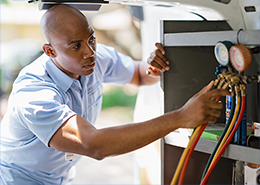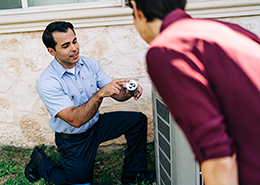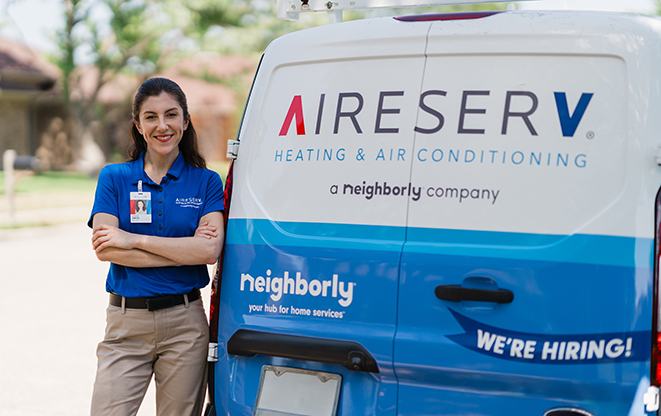You’ll often hear Pittsburgh HVAC professionals talk about good versus poor IAQ. If you’re wondering what sets one apart from the other, you’re not alone.
Poor air quality is generally that which contains particles that may adversely affect animal and human health. There are different danger levels associated with different types of contaminants, which may be organic compounds (i.e., mold spores), building materials (i.e., lead-based paint) or chemical pollutants (i.e., paint strippers). Though some of these have an indoor source, others have outdoor sources that make their way inside the building due to natural airflow and air movement.
The air within your Pittsburgh home naturally infiltrates and exfiltrates through large openings and small cracks such as doors, windows, vents, ductwork, walls and electrical infrastructure. When the temperature and humidity levels differ inside and outside of the building, outside air can flow in and inside air can flow out. Some IAQ problems are therefore not just the result of indoor pollutants, but outdoor pollution as well.
Different periods of exposure may cause varying degrees of adverse health effects. The longer your exposure to contaminants, the greater your health risks are. Some reported symptoms of poor air quality and inadequate ventilation include:
- Sick building syndrome
- Asthma symptoms
- Respiratory diseases
- Respiratory infections
- Cardiovascular disease
- Allergy symptoms
- Shortness of breath
- Cancer
Specific contaminants that may cause these symptoms include:
- Mold growth
- High carbon dioxide levels
- Pollen
- Dirt
- Dander
- Off-gassing paints, primers, furniture, electronics, treated wood, varnishes and more
- Synthetic cleaning supplies
- Candles
- Volatile organic compounds (VOCs)
- Radon gas
- Formaldehyde
- Pesticides
- And more
As you can see from the lists above, some contaminants are more severe than others. Some may also be detected through smell or sight, while others are completely invisible—such as radon gas. After tobacco smoke, radon is the next leading cause of lung cancer in North America. The only way to determine whether you’re being exposed to radon gas is with indoor air quality testing by Pittsburgh HVAC professionals.
Getting Indoor Air Quality Testing in Pittsburgh
At Aire Serv Heating and Air Conditioning, we’re a leading provider of indoor air quality testing in Pittsburgh. If you have concerns about mold or asbestos-containing materials, it’s best to contact a mold remediation company right off the bat for professional mold testing and eradication. In all other cases, we can help you to not only test the quality of your indoor air but also provide you with indoor air quality solutions as well.
Indoor air quality testing in Pittsburgh isn’t as simple as it may seem. Unfortunately, there is no single machine that can test levels of all different types of contaminants. Instead, testing tools and equipment will be selected based on suspected contaminants. For example, if carbon monoxide and radon are concerns, we’ll use special detectors designed to measure levels of these specific gasses.
There are a whole host of different detector options available that your Pittsburgh HVAC technician may use for IAQ testing. At the beginning of your appointment, we’ll discuss your main concerns with you so we know what to focus on. Some of the specialized tools and equipment we may use, depending on your goals and needs, include:
- Particle counters. Though these do not provide information on the type of pollutants in your Pittsburgh home, they can provide information about the number of small and large particles present at any given time.
- Air quality monitors. Slightly more sophisticated than particle counters, these devices provide more information on levels of broad categories of pollutants and contaminants, such as chemicals, radon levels and humidity levels, the latter of which may encourage mold growth.
- Allergy test kits. A wide variety of kits are available for different allergens and contaminants, such as VOCs, mold, dust mites, lead, pollen and dander. After taking a sample, these kits are sent to a laboratory to be analyzed.
Depending on the type of contaminant being looked for, testing may be done at a single point in time or across several weeks or months. It’s a good idea to test air quality before, during and after Pittsburgh IAQ improvement services have been used to determine the effectiveness of these solutions.
Air Cleaning and Proper Ventilation Services
Once we’ve tested your IAQ and have discovered indoor air contaminants that should be eliminated, we’ll recommend one or more of our Pittsburgh IAQ improvement services to you. The goal of these services is always to lower indoor concentrations of pollutants. Through the use of various air quality improvement technology solutions, we will significantly reduce or even eliminate most of your indoor air pollution. Total eradication is often not the goal or even possible, as low levels of some of these contaminants are not harmful to human health.
In most cases, you can expect your HVAC technician to suggest one or more of the following services to improve your IAQ:
- Air filter replacement. Cleaning, replacing and installing air filters not only keeps your Pittsburgh HVAC system in great condition but also helps remove pollutants from your air. Regular maintenance every few months is required to ensure your filters are as effective as possible.
- Media filter installation. These filters are very dense, making them more effective than your standard HVAC air filter.
- Installation of whole-house air purifiers and electronic air cleaners. These devices often use HEPA (high-efficiency particulate air) filters, which do a better job of filtering out pollutants than standard air filters.
- Air duct cleaning. Ducts are like roadways for your indoor airflow. If your ducts are full of pollutants, fresh air will pick up these pollutants and spread them throughout your home. Regular duct cleaning can prevent this from occurring.
- Ultraviolet lights. UVC and UVV lights may be installed in your Pittsburgh HVAC system to kill pollutants of concern.
- Humidifiers and dehumidifiers. Both excess and an absence of humidity can be harmful to your health. If your home is much more humid or dry than it should be, installing one of these devices can significantly improve your IAQ.
- Mechanical ventilation solutions. Unlike natural ventilation, which describes the exchange of interior and exterior air through cracks and gaps in your home known as ‘air leaks,’ mechanical ventilation promotes air exchange in a more energy-efficient way.


.webp)




